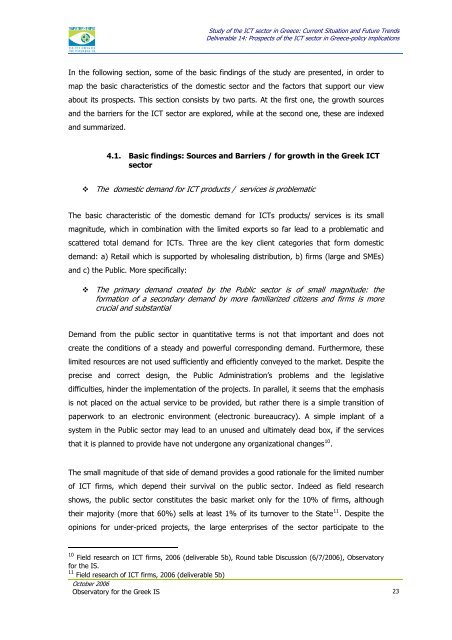Prospects of the ICT sector in Greece
Prospects of the ICT sector in Greece
Prospects of the ICT sector in Greece
- No tags were found...
You also want an ePaper? Increase the reach of your titles
YUMPU automatically turns print PDFs into web optimized ePapers that Google loves.
Study <strong>of</strong> <strong>the</strong> <strong>ICT</strong> <strong>sector</strong> <strong>in</strong> <strong>Greece</strong>: Current Situation and Future Trends<br />
Deliverable 14: <strong>Prospects</strong> <strong>of</strong> <strong>the</strong> <strong>ICT</strong> <strong>sector</strong> <strong>in</strong> <strong>Greece</strong>-policy implications<br />
In <strong>the</strong> follow<strong>in</strong>g section, some <strong>of</strong> <strong>the</strong> basic f<strong>in</strong>d<strong>in</strong>gs <strong>of</strong> <strong>the</strong> study are presented, <strong>in</strong> order to<br />
map <strong>the</strong> basic characteristics <strong>of</strong> <strong>the</strong> domestic <strong>sector</strong> and <strong>the</strong> factors that support our view<br />
about its prospects. This section consists by two parts. At <strong>the</strong> first one, <strong>the</strong> growth sources<br />
and <strong>the</strong> barriers for <strong>the</strong> <strong>ICT</strong> <strong>sector</strong> are explored, while at <strong>the</strong> second one, <strong>the</strong>se are <strong>in</strong>dexed<br />
and summarized.<br />
4.1. Basic f<strong>in</strong>d<strong>in</strong>gs: Sources and Barriers / for growth <strong>in</strong> <strong>the</strong> Greek <strong>ICT</strong><br />
<strong>sector</strong><br />
The domestic demand for <strong>ICT</strong> products / services is problematic<br />
The basic characteristic <strong>of</strong> <strong>the</strong> domestic demand for <strong>ICT</strong>s products/ services is its small<br />
magnitude, which <strong>in</strong> comb<strong>in</strong>ation with <strong>the</strong> limited exports so far lead to a problematic and<br />
scattered total demand for <strong>ICT</strong>s. Three are <strong>the</strong> key client categories that form domestic<br />
demand: a) Retail which is supported by wholesal<strong>in</strong>g distribution, b) firms (large and SMEs)<br />
and c) <strong>the</strong> Public. More specifically:<br />
The primary demand created by <strong>the</strong> Public <strong>sector</strong> is <strong>of</strong> small magnitude: <strong>the</strong><br />
formation <strong>of</strong> a secondary demand by more familiarized citizens and firms is more<br />
crucial and substantial<br />
Demand from <strong>the</strong> public <strong>sector</strong> <strong>in</strong> quantitative terms is not that important and does not<br />
create <strong>the</strong> conditions <strong>of</strong> a steady and powerful correspond<strong>in</strong>g demand. Fur<strong>the</strong>rmore, <strong>the</strong>se<br />
limited resources are not used sufficiently and efficiently conveyed to <strong>the</strong> market. Despite <strong>the</strong><br />
precise and correct design, <strong>the</strong> Public Adm<strong>in</strong>istration’s problems and <strong>the</strong> legislative<br />
difficulties, h<strong>in</strong>der <strong>the</strong> implementation <strong>of</strong> <strong>the</strong> projects. In parallel, it seems that <strong>the</strong> emphasis<br />
is not placed on <strong>the</strong> actual service to be provided, but ra<strong>the</strong>r <strong>the</strong>re is a simple transition <strong>of</strong><br />
paperwork to an electronic environment (electronic bureaucracy). A simple implant <strong>of</strong> a<br />
system <strong>in</strong> <strong>the</strong> Public <strong>sector</strong> may lead to an unused and ultimately dead box, if <strong>the</strong> services<br />
that it is planned to provide have not undergone any organizational changes 10 .<br />
The small magnitude <strong>of</strong> that side <strong>of</strong> demand provides a good rationale for <strong>the</strong> limited number<br />
<strong>of</strong> <strong>ICT</strong> firms, which depend <strong>the</strong>ir survival on <strong>the</strong> public <strong>sector</strong>. Indeed as field research<br />
shows, <strong>the</strong> public <strong>sector</strong> constitutes <strong>the</strong> basic market only for <strong>the</strong> 10% <strong>of</strong> firms, although<br />
<strong>the</strong>ir majority (more that 60%) sells at least 1% <strong>of</strong> its turnover to <strong>the</strong> State 11 . Despite <strong>the</strong><br />
op<strong>in</strong>ions for under-priced projects, <strong>the</strong> large enterprises <strong>of</strong> <strong>the</strong> <strong>sector</strong> participate to <strong>the</strong><br />
10 Field research on <strong>ICT</strong> firms, 2006 (deliverable 5b), Round table Discussion (6/7/2006), Observatory<br />
for <strong>the</strong> IS.<br />
11 Field research <strong>of</strong> <strong>ICT</strong> firms, 2006 (deliverable 5b)<br />
October 2006<br />
Observatory for <strong>the</strong> Greek IS 23
















